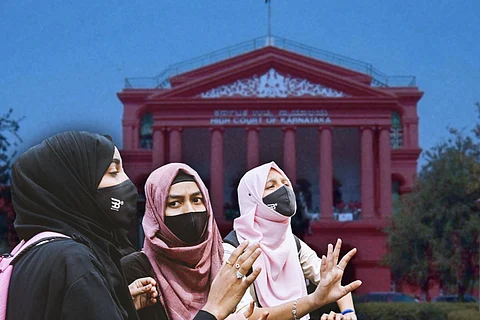

The Karnataka government reiterated its stand that wearing the hijab is not an essential religious practice in Islam, with Karnataka Advocate General (AG) Prabhuling Navadgi telling the full bench of the High Court that the petitioners have not given any material to show that it is an essential practice. The bench of Chief Justice Ritu Raj Awasthi, Justice Krishna Dixit, and Justice JM Khazi resumed hearing pleas against the hijab ban in Karnataka. The bench is also examining whether wearing the hijab is a fundamental right and whether it's an essential religious practice under Islam.
Continuing his submissions, the AG cited four judgments before the court, including the Shiroor mutt case and the Sabarimala judgment, to submit that in order to know whether a practice is an essential religious practice, one must remove that practice and see if the nature of religion changes, or if there is there a fundamental change in the religion. If it doesn’t then it is not an essential practice, the AG submitted.
“An essential part of religion refers to the core belief upon which a religion is founded. Essential practice means those practices that are fundamental to following a religious belief. It has to be seen whether the nature of religion will be changed, will there be a fundamental change in the structure of belief? Then it is an essential religious practice,” the AG added. The AG said that this particular case has five aspects — 1) Is the practice of wearing the hijab fundamental to religion? 2) Will not wearing the hijab change the religion? 3) Was practice there before the birth of religion? 4) Is the foundation of religion based on the practice? and 5) Is the practice binding to the religion?
“Petitioners have not shown any material to prove hijab is an essential religious practice. It is their burden to prove so. Our investigation has shown it is not an essential practice,” the Advocate General told the court. He added that religious practices should be mandatory and not optional to qualify as essential practices.
At the beginning of the hearing, the Karnataka High Court bench asked the AG what the government’s stand was if College Development Committees (CDC) permit the hijab to be worn. “What is your stand on whether the hijab can be allowed in educational institutions? If the CDC says hijab is allowed, will you allow hijab in uniform? You have to take a stand. If students put dupatta over their heads, will that be allowed?”
To this, the AG responded that the Karnataka government will take a decision if and when this happens. “We have left it to institutions… But our (government’s) stand is that hijab is not essential. Anything that shows religious aspects should not be there in the uniform,” AG Navadgi told the bench.
"This is our stand that hijab is not an essential religious practice. There was a statement by Dr BR Ambedkar in the Constituent Assembly where he said 'let us keep the religious instructions outside educational institutions'," Advocate General Navadgi added.
As the hearing was ending, the AG added that he has received a letter from a petitioner counsel about the misuse of the High Court’s interim order, and that students and teachers were being “harassed” at gates of schools and colleges. The Karnataka High Court bench had issued an interim order, restraining students from wearing any kind of religious clothing, be it a headscarf or saffron shawls, to high schools and colleges, till the case is being heard in court. However, the HC said that this applies only to those institutions which have a dress code that disallows the hijab. However, later, visuals emerged of students and teachers being stopped at gates and being asked to remove the hijab. The Advocate General informed the court on Monday that the Karnataka Chief Secretary has been asked to hold a meeting to address the issue. The report will be submitted to the court, he said, adding, “All such instances will be taken care of.”
The Karnataka government had, in the last hearing, submitted to the High Court that hijab is not an essential religious practice under Islam and that not allowing it on campus does not violate Article 25 of the Constitution. Navadgi had contested the submission by the Muslim student petitioners that the state government’s February 5 order mandating a dress code violates Article 25 of the Constitution. Citing the Supreme Court judgments in the Sabarimala case and the triple talaq case, the Advocate General told the High Court bench that the practice of wearing a hijab “must pass the test of Constitutional morality and individual dignity.” He also added that Article 25 (2) allows the state to make laws to restrict fundamental rights ‘in the interest of public order, morality and health.’
Here’s what has happened in the previous hearings: